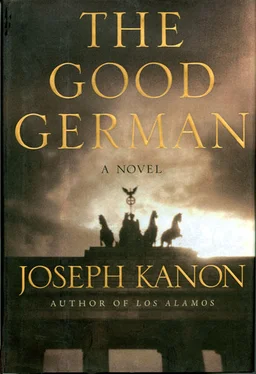“No,” Ron corrected him. “The Russians burned it, after the battle. No one knows why. Drunk, probably.” ‹›He looked away. But what was a building, compared to the rest of it? The hands you couldn’t shake off. Across the square, the Brandenburg Gate was standing, but the Quadriga had skidded off its mount, like a chariot overturned in a race. Red flags and posters of Lenin were draped on the columns, hiding some of the shell holes. As they passed into the Tiergarten he could see a large crowd milling in front of the Reichstag, GIs exchanging their bottles of Canadian Club, Russian soldiers examining wristwatches. Some of the Germans, like the two women near Tempelhof, wore overcoats in the hot afternoon, presumably to hide whatever they’d brought to sell. Cigarettes, tins of food, antique porcelain clocks. The new Wertheim’s. A few young girls in summer dresses were hanging on to soldiers’ arms. In front of the Reichstag, its charred walls covered with Cyrillic graffiti, soldiers were posing for pictures, another stop on the new tourist circuit.
At the park he hit bottom. Buildings, like soldiers, were expected casualties of war. But the trees were gone too, all of them. The dense forest of the Tiergarten, all the winding paths and silly, tucked-away statues, had burned down to a vast open field littered with dark charcoal stumps and the twisted metal of streetlamps. The jeep was heading west along the Axis, and in the far distance, over Charlottenburg, the last of the sun had turned the sky red, so that for a moment Jake could imagine the fires still burning, glowing all night to guide the bombers. A fragment of one had fallen, and a single propeller stuck up out of the ground, a surreal piece of junk, like those old refrigerators and rusting tractor parts you sometimes saw on the front yards of poor farms.
“Jesus H. Christ,” Liz said, “look at them.”
A landscape full of people, moving slowly all around them. Suitcases. Clothes tied up in bundles. A few handcarts and baby carriages. The movement of exhaustion, one step at a time. Old people, and families with no bags at all. Displaced Persons, the new euphemism. No one begged or called out, just trudged past. Going where? Relatives in a cellar? A new camp, delousing and a bowl of soup and no further address? Stunned to find, in the heart of the city, a wasteland worse than the one they had left. Yet they were moving somewhere, a survivors’ trek, just like the ones in the old engravings, wandering through the burned landscape of the Thirty Years’ War. ‹›It wasn’t supposed to end this way, Jake thought. But how else? Parades? Berlin as vibrant as ever, with the Nazis taken away? How else? The odd thing was, he’d never imagined it ending. There’d been no life outside the war, just one story that led to the next and then another. And now the last one, what happens when it’s over. You go home, Hal had said. Where he hadn’t been in ten years. So he’d come back to Berlin, another DP in the Tiergarten. Except he was in a jeep, flying past the stragglers, with a sassy girl taking pictures and a driver lighting another cigarette worth a meal. The people on foot merely glanced at them without expression, then kept going. He realized, with an unexpected lurch, that what they saw was a conqueror, one of the priapic teenagers and souvenir hunters, not a homecoming Berliner. That delusion was gone now too, with everything else.
But something must be left. Years of his life. People survived, even this He ordered Ron to turn at the Victory Column and aimed them down toward the flak towers at the zoo, his eyes still cataloguing the missing. The Kaiser Wilhelm Church, its steeple blown away. Kranzler’s in bits. More people now. The Kurfiirstendamm smashed but recognizable. No glass in the storefronts or the display boxes along the sidewalks, but occasional buildings, roulette winners in the bombing. Left down the Fasanenstrasse.
“This is out of our way,” Ron said.
“I know. I want to see something,” Jake said, his voice edgy, expectant.
A right past the Ludwigkirch, a route he could follow blindfolded, after all the nights in the blackout. The chestnut trees were gone, so that the street seemed in a kind of unnatural glare, clear all the way to Olivaerplatz.
“Stop here,” he said suddenly. They had overshot it, because there was nothing there. For a moment he simply stared, then got out of the jeep and walked slowly over to the pile of rubble. Nothing. Five stories, collapsed, the light brown facade lying now in slabs. Even the heavy wrought-iron-and-glass door had been blasted away. Crazily, he looked around for the caryatids. Gone. A washbasin perched on one of the mounds of broken plaster.
“Is this where you lived?” Liz said, her voice loud in the deserted street. He heard a camera click.
“No,” Jake said. “Someone else.”
They’d only come here a few times, when Emil was away. Afternoons, the leafy branches outside making patterns on the drawn shades. Sheets damp with sweat. Teasing her because she covered up afterward, pulling the sheet over her breasts, even as her hair lay tangled and moist on the pillow, as illicit as the warm afternoon, the room where they shouldn’t be, their time together.
“You didn’t mind before.”
“That was before. I can’t help it. I’m modest.” She met his eyes, then started to laugh, a bed laugh, intimate as touch. She turned on her side. “How can you joke?”
He fell down next to her. “It’s supposed to be fun.”
She put her hand along the side of his face. “Fun for you,” she said, but smiling because the sex was playful, part of their other excitement, getting away with something.
The early days, before the guilt.
He walked toward a small pathway in the debris. Maybe someone was still living in the cellar. But the path led nowhere. There was nothing but rubble and the cloying smell. Whose body? A stick with a piece of paper was wedged in the broken bits of plaster like a grave marker. He bent down to read it. Frau Dzuris, the fat woman on the ground floor, evidently still alive, had moved. A street he didn’t recognize in Wilmersdorf. Frau Dzuris is now residing — the quaint, formal language of a receiving card. He took out his notebook and jotted down the address. A nice woman, fond of poppyseed cakes, whose son worked at Siemens and came to lunch every Sunday. The things you remember. He turned back to the jeep.
“Nobody home?” Ron said.
Jake stopped, then let it go and shook his head. “Not here, anyway.” But somewhere. “How do they find anybody? With all this?”
Ron shrugged. “Bush telegraph. Ask the neighbors.” Jake looked at the empty street. “Or message boards. You see them at the corners. ‘Request information on the whereabouts of-you know, like a Miss Lonelyhearts club.” He caught Jake’s expression. “I don’t know,” he said, still airy. “They do, though, somehow. If they’re alive.”
An awkward silence. Liz, who’d been watching Jake, turned to Ron. “Your mother raise you or did you just get this way by yourself?”
“Sorry,” he said to Jake. “I didn’t mean—”
“Skip it,” Jake said wearily.
“Is this what you wanted to see? It’s getting late.”
“Yes, this was it,” Jake said, climbing back into the jeep.
“Okay, Dahlem,” Ron said.
Jake took a last look at the rubble. Why had he expected anything to be here? A cemetery. “Is there really hot water? I could use a bath.”
“That’s what everybody says,” Ron said, cheerful again. “After. It’s all the dust.”
Their billet was a large villa in Gelferstrasse, a suburban street behind the Luftwaffe headquarters on Kronprinzenallee that now housed the Military Government. The Luftwaffe buildings were in the same style as Goering’s ministry, gray streamlined masonry, here with decorative eagles jutting out of the cornices, poised for flight, but the compound bristled with American flags, flapping on the roofs and the aerials of cars lining the driveway. There was damage here too, burned-out patches where houses had been, but nothing like what they had just seen, and Gelferstrasse itself was in fairly good shape, almost peaceful, some of it still shaded by trees.
Читать дальше












